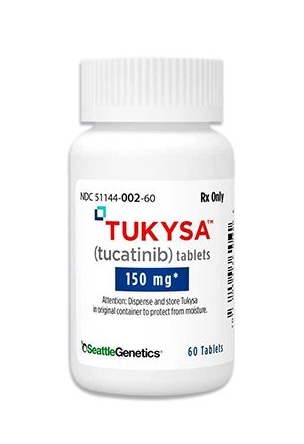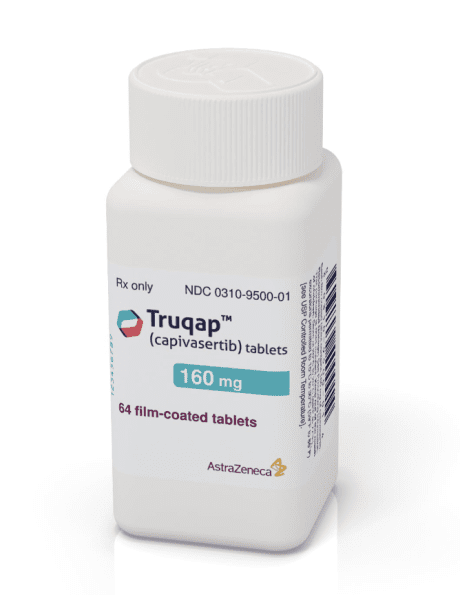Tukysa (tucatinib) vs Truqap (capivasertib)
Tukysa (tucatinib) vs Truqap (capivasertib)
Tukysa (tucatinib) is a tyrosine kinase inhibitor specifically designed to target HER2-positive breast cancer, often used in combination with other drugs like trastuzumab and capecitabine. Truqap (capivasertib), on the other hand, is an AKT inhibitor that is being investigated for its effectiveness in various cancers, including breast cancer, but is not yet approved for clinical use as of the last update. When deciding between the two, a patient must consider the specific type of cancer, the drug's approval status, and the guidance of their oncologist, as Tukysa is an established option for HER2-positive breast cancer, while Truqap's use would be experimental and contingent on clinical trial availability.
Difference between Tukysa and Truqap
| Metric | Tukysa (tucatinib) | Truqap (capivasertib) |
|---|---|---|
| Generic name | tucatinib | capivasertib |
| Indications | HER2-positive breast cancer | Advanced solid tumors with AKT mutations (investigational) |
| Mechanism of action | Tyrosine kinase inhibitor | AKT inhibitor |
| Brand names | Tukysa | Truqap (not officially branded) |
| Administrative route | Oral | Oral |
| Side effects | Diarrhea, palmar-plantar erythrodysesthesia syndrome, nausea, fatigue, hepatotoxicity, vomiting, stomatitis, decreased appetite, anemia, rash, and others | Hyperglycemia, rash, diarrhea, fatigue, nausea, decreased appetite, and others |
| Contraindications | None known | None known |
| Drug class | Tyrosine kinase inhibitor | Protein kinase inhibitor |
| Manufacturer | Seagen Inc. | AstraZeneca |
Efficacy
Efficacy of Tukysa (tucatinib) in Breast Cancer
Tukysa (tucatinib) is a targeted therapy approved for use in combination with trastuzumab and capecitabine for the treatment of adult patients with advanced unresectable or metastatic HER2-positive breast cancer, including patients who have received previous anti-HER2-based regimens in the metastatic setting. HER2-positive breast cancers are aggressive tumors that overexpress the HER2 protein. Tucatinib is a tyrosine kinase inhibitor that specifically binds to the HER2 kinase domain, thereby inhibiting the activation of downstream signaling pathways that promote tumor growth and survival. Clinical trials have demonstrated that tucatinib, when added to trastuzumab and capecitabine, significantly improves progression-free survival (PFS) and overall survival (OS) in patients with HER2-positive metastatic breast cancer compared to the use of trastuzumab and capecitabine alone.
The pivotal trial that led to the approval of tucatinib was the HER2CLIMB study, which showed a statistically significant improvement in PFS and OS for patients treated with the tucatinib combination. The median PFS was extended by several months, and the median OS was also significantly improved. Notably, tucatinib was also effective in patients with brain metastases, a group that has historically been difficult to treat. The addition of tucatinib to standard therapy provided a meaningful clinical benefit to patients with HER2-positive metastatic breast cancer, including those with central nervous system involvement.
Efficacy of Truqap (capivasertib) in Breast Cancer
Truqap (capivasertib) is an investigational drug that is being studied for its efficacy in treating breast cancer, among other types of cancer. Capivasertib targets the AKT signaling pathway, which is implicated in the growth and survival of cancer cells. In breast cancer, the AKT pathway can be hyperactivated, leading to tumor progression and resistance to other therapies. Capivasertib is designed to inhibit the activity of AKT, thereby reducing tumor cell proliferation and potentially improving patient outcomes. Although capivasertib is not yet approved for any indication, clinical trials are ongoing to determine its efficacy and safety in various settings of breast cancer treatment.
Early-phase clinical trials have shown promise for capivasertib in combination with other therapies for the treatment of hormone receptor-positive, HER2-negative advanced breast cancer, particularly in patients with PIK3CA/AKT1/PTEN-altered tumors. These alterations can activate the AKT pathway, and capivasertib may be particularly effective in this subset of patients. The drug is being evaluated in combination with hormonal therapies and other targeted agents to determine the best strategy for incorporating capivasertib into breast cancer treatment regimens. As research continues, capivasertib may become a valuable addition to the therapeutic arsenal against breast cancer, pending further validation in clinical trials and regulatory approval.
Regulatory Agency Approvals
Tukysa
-
European Medical Agency (EMA), European Union

-
Food and Drug Administration (FDA), USA

-
Health Canada

-
Therapeutic Goods Administration (TGA), Australia

-
Swissmedic (CH)

Truqap
-
Food and Drug Administration (FDA), USA

Access Tukysa or Truqap today
If Tukysa or Truqap are not approved or available in your country (e.g. due to supply issues), you can access them via Everyone.org.
How it works

Make an enquiry
Choose the medicine you want to buy, answer a couple of questions, and upload your prescription to speed things up. We’ll get back to you within 24 hours.


Make an enquiry
Choose the medicine you want to buy, answer a couple of questions, and upload your prescription to speed things up. We’ll get back to you within 24 hours.


Breeze through the paperwork
We'll guide you through the required documents for importing unapproved medicine, ensuring you have all the necessary information.


Get a personalized quote
We’ll prepare a quote for you, including medicine costs and any shipping, administrative, or import fees that may apply.


Receive your medicine
Accept the quote and we’ll handle the rest - sourcing and safely delivering your medicine.

Some text on this page has been automatically generated. Speak to your physician before you start a new treatment or medication.
Let's talk
If you have any questions, call us or send us a message through WhatsApp or email:
Contact us




